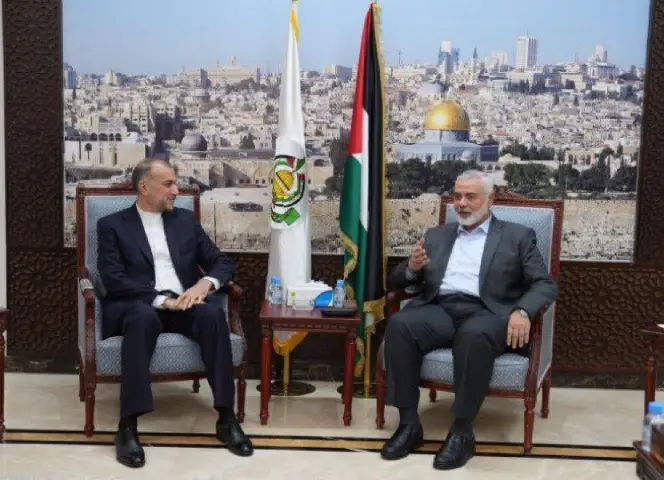Also Read: Why Iran may steer clear of joining the Israel-Hamas war


Iran's foreign minister Amir-Abdollahian with Hamas leader Ismail Hanniyeh
As fighting in Gaza tests Hamas’ stamina to wage war, the Palestinian extremist group is furious with Iran and Hezbollah for refusing to open a second front, to relieve some of the military pressure that Israel is imposing on it.
As the blowback from its terror attack on Israel on October 7 turns red hot, Hamas is blaming Tehran and Iran-backed Hezbollah for not opening another front in the north.
Hamas’ fury became evident when it slammed Hezbollah and Iran for having contributed “less than expected” to the war. The Palestinian group aligned with the Muslim Brotherhood ideology, which Shiite Iran and Hezbollah do not necessarily share, expressed dismay at the Tehran- led network’s decision not to join the war even if it undermined a “united front” against Israel.
The Hamas’ angst, however, exposes its inability to read the big picture. Notwithstanding the rhetoric, Iran rejects broadening the Gaza war into a bigger regional conflict, which was likely to drag Tehran in a destructive, if not an existential conflict with the United States.
Consequently, had he been a realist, Hamas leader, Ismail Haniyeh would not have been surprised or disappointed with his November 6 meeting with Iran’s Supreme leader Ayatollah Khamenei. Reuters is reporting that during the conversation, Khamenei scolded Haniyeh for not informing Iran in advance of Hamas’ intent to carry of the October 7 strike. Therefore, Iran was not obligated to join the Gaza war.
Gholam-Ali Haddad-Adel, a top Iranian official, confirmed in an interview, that Iran, a regional heavyweight, was looking at the big picture. He pointed out that “the Zionist entity (Israel) wants to turn the war in Gaza into a war between Iran and the U.S. We must tell people who want Iran to enter the war in Gaza that this may be exactly what the Zionist entity wants, because if that happens, the one who takes advantage of the war in Gaza will be Israel.”
Haddad-Adel is no ordinary member of the Iranian establishment. His daughter is married to Khamenei’s son, Mojtaba. His views are therefore likely to reflect the Khamenei family’s perceptions about the developments in the region.
Separately, Iran’s former Foreign Minister Mohammad Jawad Zarif, also made it plain in another interview that “our support for the Palestinian resistance doesn’t include fighting alongside it.” Clearly the entire Iranian establishment, which includes Zarif, known to be close to former Iranian reformist President, Hassan Rouhani, is united in opposing a regional conflict with Israel that could drag Washington and Iran in the fighting.
Echoing Iran’s stance and amplifying his position further, leader of the Lebanese Hezbollah, Hassan Nasrallah has said in a speech that his group will respond only to a direct Israeli strike on Lebanon, and not if Israel pummels Gaza.
A key strategic consideration is driving the Iran-backed network’s military disposition to the war. For instance, the key role assigned to Hezbollah is to prevent “regime change” in neighbouring Syria, and further advancing Iranian interests in the region including Iraq and Yemen. By diverting forces and resources towards Gaza, the Lebanese group could lose its edge in deterring subversion against the Bashar Al Assad’s government in Damascus. For Iran as the well a bigger powers including Russia and China, preventing regime change in Syria is key. Moscow and Beijing view Syria as their first defence line against broader regime change inroads by the West. In case, Assad is toppled, it would expose neighbouring Iran to another regime change attempt. Consequently, Russia and China, view Iran as their second line of defence before the Eurasian heartland is exposed to regime change attempts. It is therefore critical for Russia, China and Iran that Tehran and its proxies maintain a clear-eyed position of safeguarding bigger strategic goals in the region, avoiding expending their energies in Gaza which is of far lesser importance to them on a bigger geopolitical scale.
Unsurprisingly, as the first signs of ceasefire breakout in the war, Iran is keen to extend the truce, with an intent to make it permanent.
In an interview with the Financial Times, Iran’s foreign minister Amir-Abdollahian who was visiting Qatar, a country that exercises enormous influence on Hamas, said during the fighting, he had been sending messages to Washington via Doha that Iran had no plans in getting involved in the. Now, he wanted Qatar to discuss the next stage, of leveraging its influence to extend the current cease-fire to a long-term truce, if not a permanent cease-fire.
Coming from a different set of considerations, Iran’s views of preventing the Gaza war into a regional one, intersect with that of the United States, apart from converging with those of key Arab countries including Egypt and Saudi Arabia. The regional powers want durable ceasefire to open scope for dialogue where they can advance their interests through diplomacy and talks.
The Americans too are opposed to a regional war, recounting their misadventures in Iraq and elsewhere in the not-so-distant past.
As result, Hamas, which started the war, may have shot itself in the foot by miscalculating the response of its regional allies whose bigger strategic goals do not align with those of the narrowly focused Palestinian group.
Hailing the centre's fight against naxalism and red terror, Prime Minister Narendra Modi said that…
Defence Minister Rajnath Singh aboard India's first indigenously built aircraft carrier, INS Vikrant, on Friday…
In a coordinated operation, the North West District of Delhi Police apprehended 38 Bangladeshi nationals…
A recent report by the Tibet Action Institute has unveiled troubling evidence of mistreatment, forced…
Heavy rain lashed many districts of Kerala on Friday, disrupting normal life and causing waterlogging.…
Foreign Secretary Vikram Misri met US Under Secretary of Defence Elbridge Colby along with Indian…